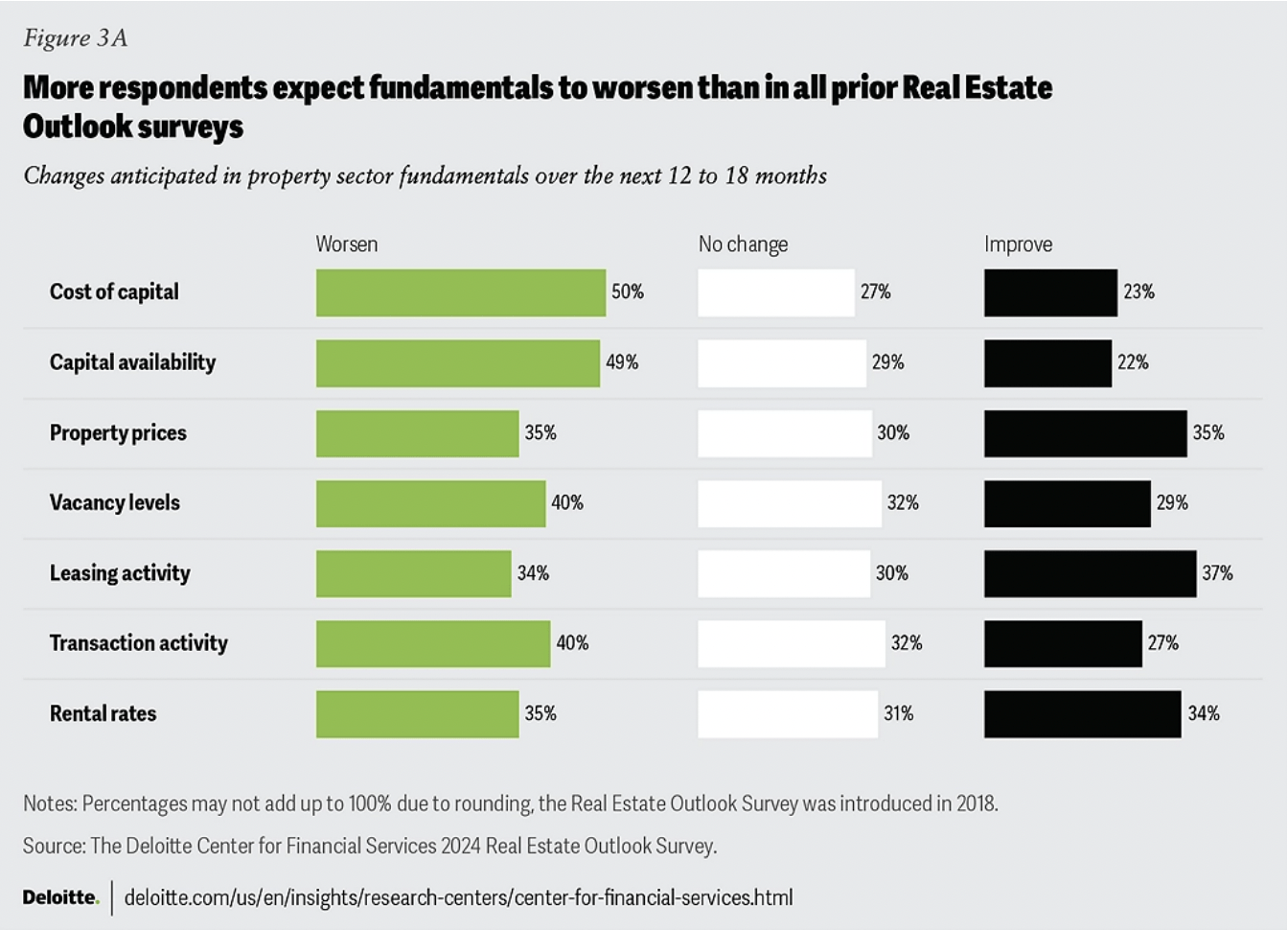Real estate investing in 2024 demands a combination of innovation, strategic foresight, and adaptability.
As we stand on the brink of technological transformation and economic flux, it’s the investors who not only embrace PropTech advancements and data analytics, but also unearth hidden opportunities and streamline operations, who are poised to succeed.
This guide dives into the top real estate investment strategies to make it through the complexities of the current market, offering insights into cutting-edge technologies, sustainable investments, and emerging markets.
With a focus on optimizing returns amidst evolving challenges, you’ll come away with a better understanding of the right investment strategies for your business in 2024 and beyond.
The current real estate market backdrop
In 2024, the real estate investment market grapples with uncertainties surrounding interest rates, impacting financing strategies significantly. Capital cost and availability are under strain, with expectations of further challenges.

As shown in Deloitte’s research above, 50% of survey respondents, who comprise real estate CFOs and their team members, believe the high cost of capital is only going to worsen in the next 12 to 18 months, with 49% stating the level of capital availability is also heading for the same fate.
However, the real estate investing landscape isn’t lacking in opportunities; investors who adapt their strategies can still find profitability. Let’s see how.
Real estate strategies to follow in 2024
1. Embrace PropTech innovations
Despite the tremendous value of real estate assets globally, the technology supporting the industry has more or less remained the same, with most real estate owners and investors still dependent on legacy technology infrastructures.
There’s an urgency for real estate investors to address this accumulated technical debt by leveraging PropTech and transitioning from legacy systems to more optimized solutions.
By embracing PropTech in real estate strategies, investors can open up opportunities for doing more with their money, making better investment decisions, and standing out from other firms to secure capital for investments.
Brian McDade of Simon Property Group embodies this shift, and the impact it’ll bring: “There’s an evolution of our business model that’s occurring… We are investing in technology at well above our historic rate to repay the tech debt that has built up. There is a competitive advantage that we’re going to have given our size and scale”.
There are myriad categories of PropTech, from smart building technology and data analytics, to investor management software and ESG measurement devices. Explore the market and see which area of your business technology can have the biggest impact.
2. Harness data analytics
A subcategory of PropTech innovation, data analytics deserves its own section due to its strategic significance to real estate investing.
Data analytics is a broad term that can encompass anything from predictive analytics tools for identifying emerging markets, to measurement devices or softwares that provide granular data reports on the environmental performance of properties.
However, despite the various ways data analytics can be used as a core strategic tool in real estate investing, only 13% of real estate companies have access to real-time business intelligence and analytics, according to real estate services firm Jones Lang LaSalle.
That means in 2024, you can find a competitive advantage by harnessing analytics tools. The use cases include:
Valuations
Analytics can be used in the due diligence process to compare cash flow projections of different properties, unearth alternative data points (such as local population growth trends), and to determine the rent premiums tenants are willing to pay for specific amenities.
Identifying opportunities
Consider using data analytics tools to analyze supply and demand trends, local market dynamics, and consumer behaviors, in order to find high performing areas and asset classes to invest in.
Two use cases are site selection, for instance using data on population and labor employment to assess an area’s growth potential, and adaptive reuse, for instance using algorithms to understand whether the design features of an office space are congruent to it being converted into a multifamily building.
Risk mitigation
Consider using data analytics in your real estate investment due diligence process to evaluate environmental risks of a property, such as flooding, wildfires, earthquakes, and other climate risks.
In the context of market volatility, asset value fluctuations, and changing property sector dynamics, traditional methods for valuing properties, identifying opportunities, and reducing risk may not suffice. Using data analytics as part of your investment strategy can serve as a powerful solution to these complexities.
3. Use real estate investor management software
Another subcategory of PropTech that deserves its own section is real estate investor management software.
A powerful strategy for General Partners (GPs) looking to scale their real estate investment operations, online investor management software addresses the inefficiencies of traditional tools, providing robust solutions for CRM, investor portals, document management, tax reporting and more.
Ultimately, adopting investor management software has a positive knock-on effect for the whole business, saving time, improving organization, streamlining communications, and crucially, strengthening relations between General Partners and their investors.
Tyler Basset of Helu Capital explains the strategic advantage investor management software can bring:
Immediately after starting to use Agora, we tripled the amount of equity we were able to attract in the next two quarters compared to the previous two. And because of that, we were able to do more deals, spend more time managing our assets, and spend less time working directly with investors.
Given the complexities real estate investors face going into 2024, in terms of capital availability and market uncertainty, any tool that facilitates stronger investor relations and fundraising capabilities should be a strategic imperative.
4. Make sustainable and eco-friendly investments
Real estate investors should consider making Environmental, Social, Governance (ESG) criteria a central part of their strategy. There are two key reasons for this: value creation and risk mitigation. Let’s unpack both.
Impact of ESG on long-term value of investments
Increased tenant demand for sustainable spaces means carbon reduction and other environmental criteria will continue to play a prominent role in both preserving and increasing asset value.
As per Deloitte: In the United States, sustainability credentials within real estate assets are now synonymous with premier Grade A office space commanding 31% higher annual rents, but when adjusted for age and location, the rent premium is 3% to 4%.
With these tailwinds, it’s no surprise that 34% of real estate leaders say they’re undertaking or evaluating capital projects in which decarbonization is a key element of the investment strategy.
This indicates a shift in real estate investment strategy, with the pendulum swinging from location-centric to design-centric decisions. Buildings designed with sustainability in mind can retain the most long-term value.
This strategy ties in closely with the integration of PropTech in your investment strategy, with various technological solutions available to upgrade and measure your property’s environmental performance.
Focusing on ESG-friendly investments to avoid stranded assets
Another reason ESG criteria should play a role in your investment strategy is to mitigate risk, specifically the risk of your investments becoming ‘stranded assets‘. This can happen when your property falls on the wrong side of environmental regulations, effectively making it obsolete unless you invest in major renovations.
As real estate investors, it’s crucial as part of your due diligence process to investigate the ESG performance of a property and the ESG regulations in the state or country it’s in.
This can be tricky, with new regulatory mandates emerging in a dynamic manner, such as Local Law 97 in New York City, which comes into effect in 2024. For guides on meeting Building Performance Standards, check out IMT’s blog resources.
5. Explore emerging markets and areas
Finding emerging markets on the cusp of exponential growth is often seen as the pinnacle of real estate investment, and while it might not always be possible to get in at the perfect time, you can still jump on the bandwagon of already growing markets.
According to Emerging Trends in Real Estate surveys compiled by Nelson Economics, the Sun Belt markets, including Miami, Atlanta, Dallas/Fort Worth, Houston, and Phoenix, look set to continue growing, offering the best opportunities for investors.
To uncover new emerging markets, find data on population and economic growth trends in local areas. Exploring emerging markets requires a keen eye for demographic shifts and economic indicators that signal growth potential. Beyond the Sun Belt, look for regions experiencing an influx of tech industries, healthcare expansions, or educational institution developments.
These sectors often act as catalysts for local economies, driving demand for both residential and commercial real estate. Additionally, consider markets with government infrastructure projects or favorable zoning changes, as these can significantly impact property values.
Finally, engaging with local real estate forums and networking with professionals in target markets can also provide valuable insights. Remember, thorough due diligence and a forward-thinking approach are crucial in identifying the next hot market before it becomes mainstream.
Tip: This report by PwC offers insightful analysis into emerging real estate trends in 2024.
6. Outsource key tasks to third-party specialists
With challenging market conditions for real estate investors, any strategy that reduces spend, adds resilience, and streamlines operations should be prioritized.
Outsourcing is one such strategy. In fact, most respondents (61%) to Deloitte’s 2024 Global Real Estate Outlook survey are looking into outsourcing various operational capabilities over the next 12 to 18 months.
For instance, rather than hiring an in-house data specialist to build real-time reporting capabilities, you can save time and money by outsourcing the technological infrastructure through use of a third-party data platform.
Another example is your tax reporting: rather than handling all your tax and K-1 preparation internally, you can save time and money by outsourcing to a specialized tax service. Agora, for example, offers tax services that allow real estate investors to cut their CPA costs by 50%, as part of our comprehensive investor management software.
7. Leverage tax abatements
As the focus on expense mitigation continues into 2024, it’s worth exploring the role of tax abatements in your real estate investment strategy.
The US government’s tax abatement programs – which differ by state – incentivize property investors to provide housing to families of specific income levels. In return, investors receive an exemption or large break from property tax.
The core benefit of this is the boost it gives to your cash flow – a key factor in determining a property’s value.
Compared to other tactics for adding value to a property – such as renovations or sustainability upgrades – getting a tax abatement is one of the most efficient, least labor intensive ways to add significant value to an investment from day one.
One investor told Agora how his firm leveraged tax abatement to add $1 million in cash flow to a property they acquired in Dallas, Texas.
The building was valued at around $70 million prior to our involvement, with a market cap rate of 4%, Rich Bouchner, who led this project, recounts. After we bought it and obtained tax abatements, it underwent a new appraisal and was valued at $84 million, with a 6.4% cap.
In terms of getting started, step one is to research the tax abatement programs in your state. From there, consider partnering up with an investor with experience in successfully implementing tax abatement programs. This will make it easier to secure approval from your local regulators.
Read more about tax abatements and real estate investing.
8. Invest in fractional ownership
Fractional ownership is another real estate investment strategy worth exploring in 2024, offering a solution to the affordability crisis by allowing investment in property shares.
This model democratizes access to real estate investing, enabling broader participation with minimal financial commitment. Platforms like Arrived, backed by notable investors, highlight the model’s viability, offering direct economic interest in properties and generating substantial dividends.
Compared to REITs, fractional ownership provides a more direct stake in property income and appreciation, making it a compelling option for diverse investors seeking entry into the real estate market with lower capital.
Before you get started, follow these tips:
- Research Thoroughly: Understand the specifics of the property and the market it’s in. Assess the platform’s credibility and track record.
- Legal and Financial Due Diligence: Familiarize yourself with the legal structure of the investment and tax implications. Review all documentation carefully.
- Diversify: Spread your investment across different properties and locations to mitigate risk.
- Understand the Exit Strategy: Know how and when you can sell your shares and any restrictions or fees involved.
9. Focus on niche markets and segments
Finding niche markets to invest in can be an effective strategy for creating a resilient portfolio.
For instance, the so-called Eds and Meds markets of Baltimore, Columbus, and Gainesville, home to higher education institutions and hospitals, serve as bulwarks against the ups and downs of the business cycle, helping protect your portfolio during a recession.
Visitor and convention center hubs like Las Vegas and Orlando, and boutique markets like Chattanooga, Des Moines, or Richmond, can also contribute to a robust investment portfolio.
Other interesting niche markets to invest in include Military Movers, referring to active members of the military who move regardless of the economic situation. Start by finding areas that are home to military bases. For further actionable advice, this article should be handy.
10. Explore buying a REIT
REITs, or Real Estate Investment Trusts, are companies that own, operate, or finance income-generating real estate, allowing individuals to invest in large-scale properties without having to buy them directly.
Despite facing challenges from macro factors and a mixed sector outlook, REITs are well-positioned for growth in 2024, especially in areas like healthcare and industrial sectors.
Look for REITs prepared for a higher-for-longer rate environment, with strong fundamentals, diversified asset portfolios, and strategic positioning in growth sectors.
This approach to real estate investing offers a promising avenue for capitalizing on potential market rebounds and benefiting from the sector’s resilience.
As always, be sure to do thorough due diligence into REIT performance risks.
Key takeaways for real estate investors
As we look ahead, the real estate investment landscape is distinctly shaped by the convergence of technology, sustainability, and market adaptability.
Investors should tap into the power of PropTech and data analytics, not only as enhancements but as fundamental components of their real estate investment strategy. The emergence of investor management software and the focus on ESG investments reflect a broader shift towards efficiency, accountability, and long-term value creation.
The pursuit of fractional ownership and the exploration of niche markets offer pathways to diversification and resilience in a fluctuating economic environment. Meanwhile, the strategic utilization of tax abatements underscores the importance of savvy financial planning in optimizing returns.
The collective wisdom distilled from these strategies underscores a singular truth: success in the 2024 real estate market demands more than capital; it requires insight, innovation, and a willingness to adapt.










